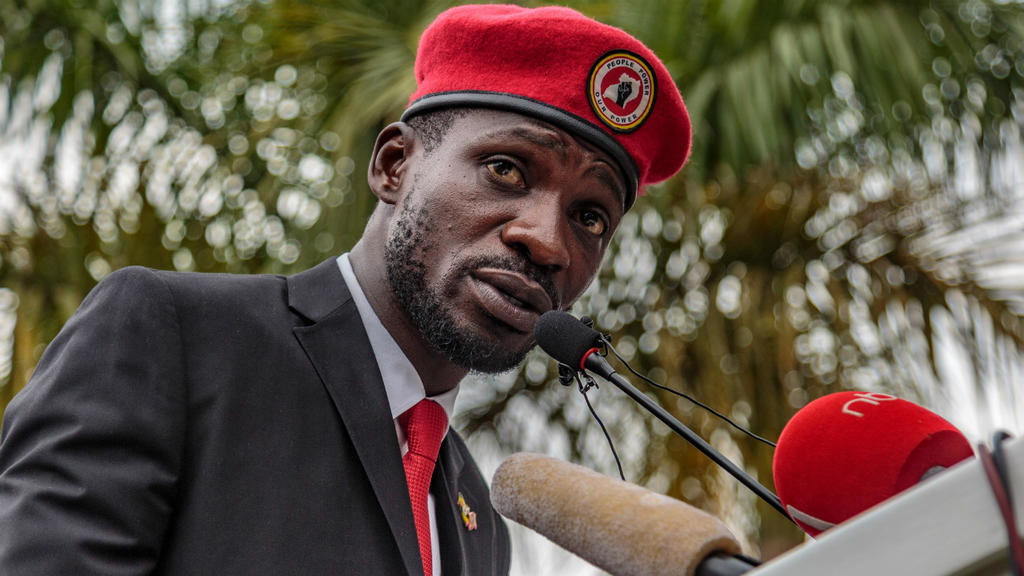Political crackdown intensifies in Uganda as Bobi Wine charged with ‘annoying’ Museveni
A Ugandan court on Tuesday charged Bobi Wine, a singer-turned-politician and avowed adversary of President Yoweri Museveni, with “annoying” the country’s leader in a move some analysts say is part of a “worrying” increase in political repression.
The 37-year-old, whose real name is Robert Kyagulanyi, was summoned to court on a charge of treason for an incident in August 2018 in which he and other opposition figures allegedly threw stones at Museveni’s presidential convoy while he was campaigning for in the 2018 Arua by-election race.
Upon appearing in court on August 6, Wine was accused of the additional offence of having “annoyed” the president – a charge which is “much easier to prove”, according to FRANCE 24 Uganda correspondent Grainne Harrington.
The new charge comes just weeks after Wine’s announcement that he will stand against Museveni – who has ruled Uganda since 1986 – in the 2021 presidential elections.
‘Panic mode’
The court’s accusation provoked a fierce retort from the ragga star, who told Agence France-Presse that the 74-year-old Museveni’s government is in “panic mode”.
“Who on earth can’t be annoyed?” Wine went on to ask.
“Wine is right to say the government is panicking,” Michael Mutyaba, a Uganda-based researcher for the British risk consultancy firm Oxford Analytica, told FRANCE 24. “The country has a growing population of young people and an ageing president who is seen as corrupt – while Wine represents a youth movement eager for change.”
The singer-turned-politician has long used his music to make the case for political change in Uganda. The introduction to his 2016 hit “Situka” (“Rise up” in the Luganda language) shows him at his most polemical: “When leaders become misleaders, and mentors become tormentors, when freedom of expression becomes a target of suppression, opposition becomes our position,” he sings.
“The singer’s way of his conveying his messages – ‘edutainment’, as he calls it, using entertainment to educate people – explains the big increase in his popularity recently and a corresponding decline in that of Museveni, in a country where two-thirds of the population is under 30,” said Emmanuel Dupuy, a Uganda expert and head of the IPSE (l’Institut Prospective et Sécurité de L’Europe) think-tank in Paris, in an interview with FRANCE 24.
Perhaps even more worryingly for Museveni, polling data suggests that disillusionment with Museveni’s presidency is not just confined to the country’s burgeoning youth. Overall, 65 percent of Ugandans oppose Museveni’s 2017 decision to eliminate the presidential age cap of 75 – thereby removing an obstacle to his possible re-election to a sixth term in 2021 – according to a May 2019 poll for the Research World Institute. The pollsters found that every age group agreed with that view, with even 55 percent of over-60s expressing their opposition to Museveni’s abolition of the age limit.
Violence against Wine ‘on another level’
Wine is not the only Ugandan civil society figure to have been targeted with criminal proceedings over the past week. Stella Nyanzi, an academic and vociferous critic of Museveni, was jailed for 18 months on August 1 for the “cyber harassment” of the president in what prosecutors called a “brutish attack on the person of the president and his late mother”.
Her crime was to have written a lengthy and colourful Facebook post in 2018, expressing the wish that the head of state had been burned by the “acidic pus” in his mother’s birth canal. Nyanzi was previously jailed in 2017 for calling Museveni a “pair of buttocks”.
Nor is Wine the only political challenger to have faced treason charges during Museveni’s tenure. Kizza Besigye, leader of the Forum for Democratic Change (FDC) party, stood against the head of state in the 2001, 2006, 2011 and 2016 elections – with the 2006 results going to the courts for a judicial review that found widespread vote-rigging in Museveni’s favour.
“Besigye and FDC supporters have long been subjected to mistreatment, with Besigye notably being charged with treason in the past and repeatedly beaten up, arrested and put under house arrest,” Eloise Bertrand, a researcher in Ugandan politics at Warwick University, told FRANCE 24.
Nevertheless, she said, “the level of violence targeting Bobi Wine appears to have gone to another level, which is very worrying”. She cited an incident that coincided with the Arua by-election last year when Wine’s driver was shot dead and he was allegedly tortured.
The trivial charges against Wine and Nyanzi for merely “annoying” Museveni or engaging in vulgar rhetorical attacks on him and his deceased mother also point to a heightening climate of repression in the country, Dupuy said. “Of course, in many other countries these charges would, unquestionably, be considered contraventions of freedom of speech, and they show that repression is definitely increasing in Uganda.”
But such moves may “backfire” for Museveni politically, said Ben Shepherd, a former adviser on Africa at the UK Foreign Office and now an associate fellow at Chatham House think-tank in London.
“They’ve brought the president down into the fray of everyday politics, rather than allowing him to stay above it,” said Shepherd. “And the moves against Bobi Wine have provoked a backlash that has given him vastly increased international attention.”
Source: France 24





